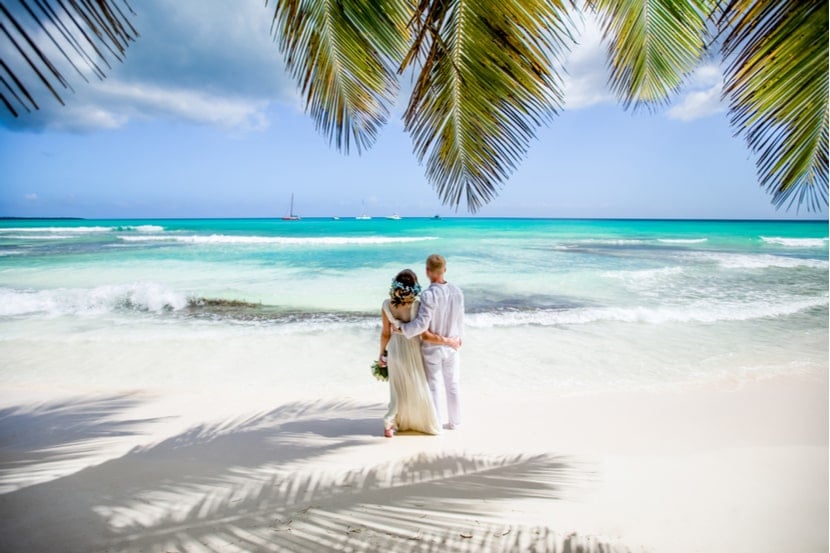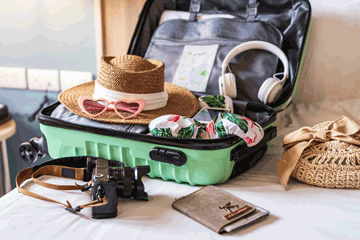So, you want to say "I do" somewhere unforgettable! A wedding abroad is an incredible way to start your next chapter together, but it does need a little extra planning. Here's everything you need to know: the paperwork required, insurance options, popular destinations and costs to consider. Keep reading!

Will travel insurance cover my wedding?
It can! It mainly depends on what policy you have and the level of cover you've got.
To be specific, a standard travel insurance typically has your back for the 'usual' things that can go wrong while abroad. For example, getting sick while you're away and needing medical care. Or, having to cancel your trip before it starts because something happens, like injury. If your flight is delayed or cancelled, standard travel insurance might even cover that, too. Phew!
But, for anything wedding specific, you'll likely need a specialist wedding policy. Like its name suggests, this type of policy can offer tailored cover for your special day. For instance, covering the cost of venue hire if you had to cancel or reschedule. Or, reimbursing you if your jaw-dropping white dress goes astray.
Do I need specialist wedding insurance?
It's not a legal requirement. So, technically, no—you don't need it. But, if you're planning a wedding with all the trimmings, a specialist wedding insurance policy is worth thinking about.
Generally, these policies often cover weddings abroad, but always double-check to make sure. With the right coverage in place, you can have the peace of mind you're covered should the unexpected happen. Some policies can even cover up to £50,000, which can bring some serious peace of mind for such a special event!
Reach out to your insurer if you're thinking about specialist wedding insurance. If you've already got standard insurance, they might be able to adjust the policy to tailor it to your wedding. If you're still shopping around, don't be afraid to reach out to the providers you like to see what they might be able to offer.
When you get a quote with us, you'll be able to select the minimum amount of cover you want, such as cancellation cover. By doing so, you'll be able to filter out any policies that don't offer a sufficient level of cover.
Helpful hint: Have a home contents insurance policy? Certain things might already be covered under it, like your engagement and wedding rings! Check your policy to see what's covered. Usually, rings under £1,000 are covered as standard, but for anything over that, you'll probably need to make your insurer aware.
What does wedding insurance cover?
Most wedding insurance policies cover things like:
-
The venue closing or cancelling your booking. If this happens, you'll usually be covered.
-
Cancellation due to illness, accident, or an emergency. This is usually on the condition its within the bridal party or close family.
-
Having to cancel because of dangerous weather. If hazardous weather prevents your wedding from going ahead, you could be compensated. But, not all policies cover this, so make sure to check if yours does.
-
Vendor or supplier failure. If your vendor or supplier doesn't show up.
-
Lost, stolen or damaged items. If something goes missing, gets stolen or is accidentally lost, like a wedding dress, your policy will typically cover the cost.
-
Wedding photography or videography issues. If there's a fault with the imagery, for instance.
Just remember that every wedding policy is different. So, make sure you check the small print of your policy!
What doesn't wedding insurance cover?
A wedding insurance policy generally excludes:
-
Deciding you no longer want to get married. If you have a change of heart and no longer want to go through with the wedding, your insurer probably won't cover you.
-
Cancellation because of financial reasons. If you decide to cancel your wedding because of the cost, you likely won't be covered.
-
Wanting to cancel over a small issue. If there's a minor issue that makes you want to cancel, like your wedding cake not being made on time, insurers usually won't pay out.
Keep in mind, there might also be restrictions around location. For example, most insurers won't cover weddings in areas of ongoing conflict, such as Ukraine and Russia.
What legal documents do I need to get married abroad?
When planning to tie the knot in some far-off paradise, be prepared: every country has its own rules for making a marriage official!
You'll likely need to bring some important documentation with you in your suitcase, just to make sure your wedding goes to plan. Here's some of the documents you might be asked to provide:
- A valid passport. The last thing you want are passport problems at customs! Make sure you've got at least 6 months left on your passport. And, some countries can have other specific rules for passports, like a blank page to stamp—so do your research well in advance.
- A full birth certificate. This one's easy enough, but check whether you'll need to bring your long certificate. Some countries have this as a requirement!
- An adoption certificate. If you're adopted, you'll also need to bring this.
- Divorce papers if you've been married before.
- A death certificate of your previous spouse if you're a widower.
- Any relevant visas needed to enter the country.
- A Certificate of No Impediment (CNI) which we'll explain below!
What is a CNI certificate?
A CNI shows there's no legal reason you can't marry or enter a civil partnership.
Sometimes, certain countries ask for this certificate to be 'legalised'. This is where it's stamped for authenticity. In some cases, some countries might even ask for the CNI to be translated. Other times, though, agreements between specific countries might mean you don't need a CNI at all.
To avoid any hiccups, it might be worth doing a bit of research on your wedding destination. Start with the UK government's basic information on your chosen country. Then, reach out to British embassies or official departments to clarify the exact requirements.
Will my marriage be legal in the UK if I get married abroad?
Yes, your marriage should be recognised in the UK if:
-
It’s legal in the country where you’re getting married.
-
It would also have been legal if you'd done it in the UK
Unsure if these apply for the destination you're planning? Don't worry. You can check any specific local requirements for weddings on the GOV.UK website.
How much does it cost to get married abroad?
Planning a wedding can certainly be exciting, but it's important to consider all the potential costs.
First, think about flights—not just for you and your partner but also for your guests. If you've got plans for a bigger crowd, you might be considering covering some of their travel expenses. Then, there's the accommodation: will you pay for a group stay, or are your guests expected to handle their own bookings? Either way, it could be worth finding out if the wedding venue offers discounted rates or packages for a wedding party.
Oh, and don't forget about travel insurance, either! It's important to protect your wedding plans, especially when they involve things like flights, transfers and hotel stays. And, if you're bringing expensive items like a wedding dress with you, having coverage in place can offer peace of mind should anything happen. For example, getting lost in transit.
To make budgeting for your special day abroad easier, why not try our holiday budget calculator? You can use it for tracking things like flights, accommodation and travel insurance costs. So, it could be handy in helping you stay on top of your wedding travel expenses.
Top destinations for getting married abroad
If you've got your heart set on a destination wedding, you're not alone. Travel specialist Kuoni saw a 40% increase in forward sales of weddings abroad since 2020!
Here's some popular places Brits get married abroad:
-
Greece
-
Turkey
-
Egypt
-
Croatia
-
Mexico
-
Italy
-
Cyprus
-
Dominican Republic
When should I buy wedding insurance?
It's worth thinking about purchasing insurance as soon as you can.
Most policies have a timeframe after purchasing where you won't be covered if anything goes wrong. So, thinking about buying a policy before you start booking things like suppliers and the venue is a great idea. That way, you'll know you're covered should anything go wrong. You might even be able to get coverage in place up to 2 years before your big day!
Other top tips for tying the knot overseas
Here's some simple advice to make planning your day as smooth and stress-free as possible:
Get everything in writing
This might seem like a no-brainer, but always get written confirmation for anything important. Don't rely on promises made over the phone—it'll save you from mix-ups later. Written confirmations help everyone stay on the same page about costs, agreements and any special details.
Check your passports
Amid all the excitement, don't forget the essentials—your passports! Check how much time you need left on your passport to enter the country. If there's any doubt, use our passport checker tool. It's definitely worth updating them well before your big day. You should be able to find information on your destination's passport requirements on GOV.UK.
Check the weather
Weather conditions can be unreliable wherever you are in the world. But, you can improve your chances of it not affecting your day by researching beforehand. Start by checking what time of year is likely to have ideal weather for your ceremony. And just in case, it's worth having a backup plan in place. For example, if you're having an outdoor wedding, consider having a marquee in case it starts to rain.
Be prepared
Planning an overseas wedding takes time, so start early! This gives you enough room to handle any legal requirements, which can take months in some places. Also, think about what to pack, and let your guests know what to bring. Skip heavy formalwear if you'll be somewhere hot—no one wants to be melting in a suit on the beach!
Get help
Weddings are a lot of work, and you don't need to do it all yourself! Hiring a wedding planner might be a great option to consider. You'll be able to share the workload with them. Oh, and they usually have a good understanding of the ins and outs of overseas wedding rules and regulations, too.
Compare travel insurance








